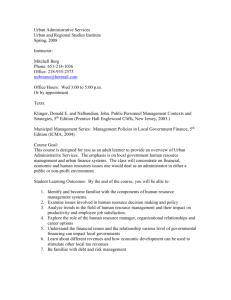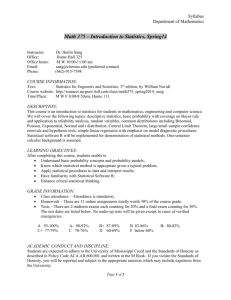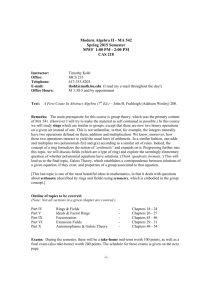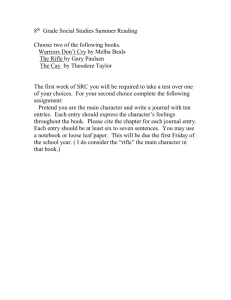PSB 3002 Physiological Psychology Spring Semester 2015
advertisement
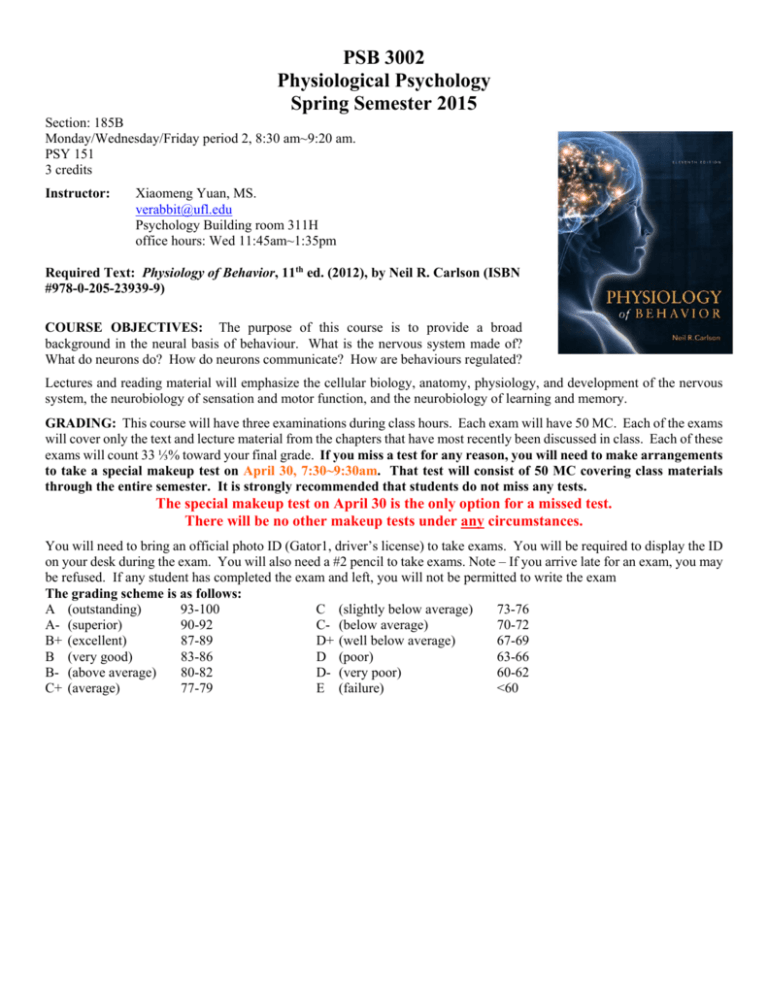
PSB 3002 Physiological Psychology Spring Semester 2015 Section: 185B Monday/Wednesday/Friday period 2, 8:30 am~9:20 am. PSY 151 3 credits Instructor: Xiaomeng Yuan, MS. verabbit@ufl.edu Psychology Building room 311H office hours: Wed 11:45am~1:35pm Required Text: Physiology of Behavior, 11th ed. (2012), by Neil R. Carlson (ISBN #978-0-205-23939-9) COURSE OBJECTIVES: The purpose of this course is to provide a broad background in the neural basis of behaviour. What is the nervous system made of? What do neurons do? How do neurons communicate? How are behaviours regulated? Lectures and reading material will emphasize the cellular biology, anatomy, physiology, and development of the nervous system, the neurobiology of sensation and motor function, and the neurobiology of learning and memory. GRADING: This course will have three examinations during class hours. Each exam will have 50 MC. Each of the exams will cover only the text and lecture material from the chapters that have most recently been discussed in class. Each of these exams will count 33 ⅓% toward your final grade. If you miss a test for any reason, you will need to make arrangements to take a special makeup test on April 30, 7:30~9:30am. That test will consist of 50 MC covering class materials through the entire semester. It is strongly recommended that students do not miss any tests. The special makeup test on April 30 is the only option for a missed test. There will be no other makeup tests under any circumstances. You will need to bring an official photo ID (Gator1, driver’s license) to take exams. You will be required to display the ID on your desk during the exam. You will also need a #2 pencil to take exams. Note – If you arrive late for an exam, you may be refused. If any student has completed the exam and left, you will not be permitted to write the exam The grading scheme is as follows: A (outstanding) 93-100 C (slightly below average) 73-76 A- (superior) 90-92 C- (below average) 70-72 B+ (excellent) 87-89 D+ (well below average) 67-69 B (very good) 83-86 D (poor) 63-66 B- (above average) 80-82 D- (very poor) 60-62 C+ (average) 77-79 E (failure) <60 ADDITIONAL SUPPORT FOR STUDENTS WITH DISABILITIES: Students requesting classroom accommodation must first register with the Dean of Students Office. The Dean of Students Office will provide documentation to the student who must then provide this documentation to the Instructor when requesting accommodation. ACADEMIC HONESTY GUIDELINES: The academic community of students and faculty at the University of Florida strives to develop, sustain and protect an environment of honesty, trust and respect. Students are expected to pursue knowledge with integrity. Exhibiting honesty in academic pursuits and reporting violations of the Academic Honesty Guidelines will encourage others to act with integrity. Violations of the Academic Honesty Guidelines shall result in judicial action and a student being subject to the sanctions in paragraph XI of the Student Conduct Code. The conduct set forth hereinafter constitutes a violation of the Academic Honesty Guidelines (University of Florida Rule 6C1-4.017). Cheating. The improper taking or tendering of any information or material which shall be used to determine academic credit. Taking of information includes, but is not limited to, copying graded homework assignments from another student; working together with another individual(s) on a take-home test or homework when not specifically permitted by the teacher; looking or attempting to look at another student's paper during an examination; looking or attempting to look at text or notes during an examination when not permitted. The tendering of information includes, but is not limited to, giving of your work to another student to be used or copied; giving someone answers to exam questions either when the exam is being given or after taking an exam; giving or selling a term paper or other written materials to another student; sharing information on a graded assignment. Plagiarism. The attempt to represent the work of another as the product of one's own thought, whether the work is published or unpublished, or simply the work of a fellow student. Plagiarism includes, but is not limited to, quoting oral or written materials without citation on an exam, term paper, homework, or other written materials or oral presentations for an academic requirement; submitting a paper which was purchased from a term paper service as your own work; submitting anyone else's paper as your own work. Bribery. The offering, giving, receiving, or soliciting of any materials, items or services of value to gain academic advantage for yourself or another. Misrepresentation. Any act or omission with intent to deceive a teacher for academic advantage. Misrepresentation includes using computer programs generated by another and handing it in as your own work unless expressly allowed by the teacher; lying to a teacher to increase your grade; lying or misrepresenting facts when confronted with an allegation of academic dishonesty. Conspiracy. The planning or acting with one or more persons to commit any form of academic dishonesty to gain academic advantage for yourself or another. Fabrication. The use of invented or fabricated information or the falsification of research or other findings with the intent to deceive for academic or professional advantage. UF's Academic Honesty Policy is clearly stated in rule 6Cl-4.0l7 Student Affairs: Academic Honesty Guidelines. WEBSITE: PowerPoint images from lectures will be available for students to review at the course website on Sakai. If you experience any difficulty, contact the UF help desk as early as possible. Free software to view the images is available through the website. Additional materials and interesting links will also be posted on this site. COURSE SCHEDULE: (This schedule is tentative. The timing of topics covered may change, and therefore the chapters assigned to examinations will be adjusted accordingly – details will be described in class. The dates of exams will not change.) For critical semester dates see http://www.registrar.ufl.edu Approximate Dates Chapter and Topic Jan 7, 9 Jan 12, 14, 16 Jan 21, 23, 26 Jan 28, 30, Feb 2 Feb 4 Feb 6 Chapter 1: Introduction Chapter 2: Structure and Function of Cells of the Nervous System Chapter 3: Structure of the Nervous System Chapter 4: Psychopharmacology review session Exam #1: Chapters 1 - 4 Feb 9, 11, 13 Feb 16, 18, 20 Feb 23, 25, 27 March 9, 11, 13 March 16 March 18 Chapter 6: Vision Chapter 8: Control of Movement Chapter 9: Sleep and Biological Rhythms Chapter 10: Reproductive Behavior review session Exam #2: Chapters 6, 8-10 March 20, 23, 25 Chapter 11: Emotion March 27, 30, April 1 Chapter 12: Ingestive Behavior April 3, 6, 8 Chapter 13: Learning and Memory April 10, 13 Chapter 17: Anxiety Disorders, Autistic Disorder, ADHD, and Stress Disorders April 15, 17 Chapter 18: Drug Abuse April 20 review session April 22 Exam #3: Chapters 11-13, 17-18 April 30 Optional Final Exam Exam 1~3 will be held during regular class meeting time, which is period 2 8:30~9:20am. And the optional final will be held during 7:30~9:30am, since it will cover chapters taught through the semester. Note that we will skip chapters 5, 7, 14, 15, and 16. Students are encouraged to read these chapters according to their interests. Additional courses are available that cover the material in these chapters in greater depth. The chapters we will cover in this course will provide a solid foundation in Behavioural Neuroscience, which will prepare students for more advanced courses that are offered by faculty of the Behavioral and Cognitive Neuroscience program. Those more advanced courses include courses on the neurobiology of additional sensory systems (hearing, taste and smell), the neurobiology of ingestive behaviour (feeding and drinking), the neurobiology of emotion, the neurobiology of stress, the neurobiology of developmental disorders, the neurobiology of learning and memory, the neurobiology of drug addiction, etc.
